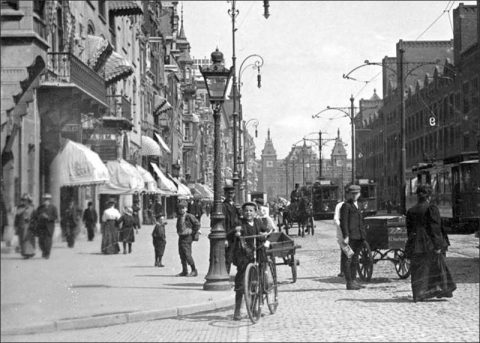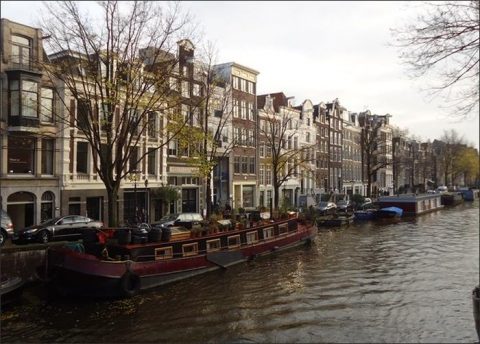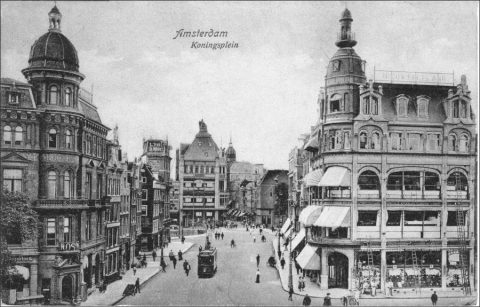Those from outside the Netherlands generally know very little about the country’s history between the time of Napoleon and the Second World War. The Revolt of the Netherlands and the Golden Age of the Dutch Republic are familiar territory, but to most foreigners there is a veil of mystery – even nonentity – drawn over the country towards the end of the eighteenth century, marked perhaps by the resounding defeat of the Dutch and their economic pretensions in the Fourth Anglo-Dutch War (1780–84). Since the Second World War the Netherlands has become better known again, as a formidable if small economic force in an integrating Europe, and as a reputed haven of permissiveness and licentiousness: everyone knows Amsterdam.
That Dutch history has been obscure in the nineteenth and early twentieth century is hardly remarkable: it was not the cradle of industrial revolution, there were no violent political revolutions, nor any nationalist uprising for unification. Other countries have suffered similar historiographical fates: what do most of us know of the once-great Spain, or Portugal in the same period, to say nothing of Denmark and the rest of Scandinavia?
Nonetheless, this book sets out to bring the Dutch back into the limelight in this internationally rather forgotten period, and to show to the non-Dutch-speaking world that the Netherlands had a fascinating and instructive history at this time, just as much as it did in the heady days of the Republic, or has done in the economic boom since the Second World War. Dutch economic and social historians themselves have long been aware of the rewards of this era: most of that extremely prolific profession works on the period since 1750 or even since 1850, rather than on the Golden Age.
‘The Netherlands’ refers to the Kingdom of the Netherlands as it is now constituted, but with some additions: during the period of French domination from 1795 to 1813 the present country was heavily influenced by France and at times subject to direct rule from Paris; from 1815 to 1830 it was united in one state with what is now Belgium; there were considerable border changes around what has since become the independent Duchy of Luxembourg; and the Netherlands possessed an enormous overseas empire, much of which survived and thrived throughout the nineteenth century right up to the Second World War.
As for timing, the period covered here concerns what might be called the ‘long’ nineteenth century. Comprehensive coverage is offered between 1813 and 1914, the dates of the Netherlands’ escapes from past occupation by one foreign emperor and from potential domination by another. However, the frame of reference is very much wider, for the reason that the book seeks – principally in the nineteenth century – an explanation for the characteristics of Dutch society in the more familiar later twentieth century. This approach might be branded teleological, or even triumphalist, but in truth it amounts to little more than a frank recognition that the questions historians ask of their material in the past are substantially governed by their society’s concerns in the present. This does not mean that anything which did not lead directly to the present situation should be ignored.
On the contrary, what has been discarded is often as interesting as what has been embraced, for the ‘constituting other’ is as important to the make-up of the identity of a person, group, nation or state as are the essentialist characteristics which are recognized as fundamental. This is therefore an approach to history which is almost universal, if not universally admitted. It can be elaborated into a major epistemological framework, such as modernization theory, but in truth it is equally valid if portrayed as a straightforward wish to illuminate the present with a knowledge of the past. In the simplest terms, then, the Netherlands is today a crowded, prosperous and relatively tolerant country: how did that come about?
Deciding where to start and finish is always an issue for the historian: on the principle of ever-continuing causation, one should start with prehistory. However, in practical terms, the French period (1795–1813) is accepted in this volume as an important hiatus, with full recognition of the simultaneous continuities, especially in demographic and economic matters. A recent major work on the economy of the Republic, by Jan de Vries and Ad van der Woude, has concluded that the period 1780–1815 marked the death of the ‘first phase of modern economic growth’
in the Netherlands, and Jonathan Israel’s rather less radical approach to the same subject has also accepted that the economic power of the Republic was winding down in the eighteenth century, and died a death in the French period. Although the nineteenth-century economy was certainly based on the events and structures of the previous period, the advent of a unitary state to replace the federal structure of the Republic makes the closing stages of the French period an intelligent place to start the history of the modern period. Nonetheless, there will be frequent reference here to the later eighteenth century and indeed the earlier Republic, especially in economic and socio-political matters.
As for the end-point, the case is even less clear-cut. It is the contention of this work that a transition to a modern society – the modern Netherlands – had been substantially completed in a demographic, economic and socio-political sense by 1914, and that is why the comprehensive coverage will tail off around that time. However, it would be foolish to deny that many of the developments had some of their most important changes still to come at that time – one could mention the decline in the birth rates, the rise of the great Dutch multinationals, or the welfare state – and so in many areas this ‘history’ will include taking the analysis well beyond the First World War, and in some cases past the Second.
Nonetheless the extended nineteenth century remains the focus. De Vries and Van der Woude have claimed that modern economic growth was achieved in the Republic; that claim is contentious, but all would agree that it had to be achieved again (or perhaps for the first time) in the nineteenth century, in Kuznets’ sense of sustained growth in national income per capita, accompanied by major population growth and structural change across all sectors in the economy. This was the century of the ‘demographic transition’; in social history, the nineteenth century was the one of integration and location of the Dutch people in the wider national community, of emancipation, democratization, and the beginnings of modern mass education and the welfare state. Of course these developments continued after 1914, but – as will be demonstrated in the following chapters – the fundamental structural die had been cast in the nineteenth century.
In 1988 three ‘Young Turks’ (as they styled themselves on the day) issued a clarion call for some direction in the researching and writing of the economic and social history of the Netherlands, a manifesto they entitled, Dutch history as deviation. Its authors were worried about foreign historians ‘cherry-picking’ Dutch history, and called for a more programmatic approach to historical work, based on investigating the ways in which the Dutch have proved themselves unusual: in their ‘pillarized’ socio-political system, for example.
The year before, the proceedings of a major historiographical review conference at the University of Utrecht had cast doubt on certain aspects of Dutch historical work, with an especially stinging attack on the practice of economic history, from Richard Griffiths. It was a time of self-doubt in the profession throughout the Western world: with all the specialization and proliferation of the 1960s and 1970s, the discipline seemed to have lost some of its direction. In the event Dutch history, and economic and social history in particular, has gone from strength to strength, with increasing amounts of very high quality work being produced, and even some attempts at synthesis rather than further fragmentation. The debates and controversies in Dutch history will be outlined here where appropriate, for they often point to the heart of the issue, and reflect unerringly what the Dutch themselves have thought about their past (and their present) at various stages.
The acknowledged master of political and cultural history, Ernst Kossmann, remarked in his Oxford edition of The Low Countries 1780–1940 that Dutch culture had – with the exception of theologians – produced very few writers of constructive synthesis, especially among historians. This was perhaps a little rich coming from one who was engaged in writing precisely that kind of constructive synthesis himself, and the deficit has certainly been radically reduced in recent years, with large numbers of book-length studies as well as the customary proliferation of excellent essays and articles. But in economic and social history it is still the case that there have been very few attempts at synthesis.
The standard work on the modern period remains that written by I. J. Brugmans in the 1950s; 7 despite being severely dated in many respects, it is still the only comprehensive single-authored work covering the whole subject, and it remains today an invaluable source of information. (It is also uncanny how much of Brugmans’ analysis has been vindicated in recent years.) There have been edited collections which attempt the task of covering the whole modern period, for example in the multi-volume national history, General history of the Netherlands, which appeared in the late 1970s and early 1980s.
Some of the contributions were exemplary, especially those by Theo van Tijn on social history, but inevitably the coverage and quality was uneven. That was also true of an edited volume on Dutch society since 1815, appearing in 1985, which contained a particularly useful synthesis on demography. In economic history, Jan Luiten van Zanden evidently possesses all the skills of research, synthesis, and more, in order to produce a masterly and comprehensive synthesis on the nineteenth century, but has not yet chosen to do so. So the fact remains that, since the labours of Brugmans forty years ago, we have no general socio-economic history of the Netherlands in the modern period, in either Dutch or English.
The geographical coverage is of the nation as a whole, although the urban areas of the West tend to predominate, as they do in all Dutch historiography above the regional level. On the other hand, one of the extraordinary features of modern Dutch history is the surprising regional diversity in such a small country; that diversity, and its eventual demise before the advance of the centralization and state-building of the last two centuries, frequently forms a starting point for the investigation in the subsequent chapters.
Often I have taken the advice of the ‘Young Turks’ and adopted as entry point an unusual feature of the Dutch experience compared to their neighbours: their extremely rapid population growth, their awesome death rates, their staggering fertility, their large and efficient service sector, their overseas empire, their ‘pillarization’, their relative tolerance. But by way of balance there is also an attempt to pay attention to the ordinary in the Netherlands: what people ate, how much they earned, what they thought about public affairs, how they wooed and wed. The word ‘Sonderweg’ is not used of Dutch history as it is of German, but many historians implicitly adopt a comparable agenda: While the Dutch were interesting and unique in certain ways, their place is Wrmly within the maritime core of industrializing Northwest Europe; their uniqueness is meaningless removed from that environment, and their attributes shared with their neighbours far outweigh their idiosyncrasies.
The objective is to present the reader in the Netherlands and further afield with an image of the period as whole, in its several aspects. The extended nineteenth century was one of fundamental change in all sectors of the life of the Dutch community; by 1914 most of the major developments which were to shape the country of today had already taken place, or were well on their way.
Hits: 190


